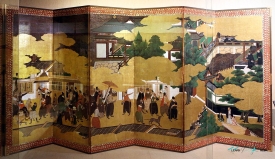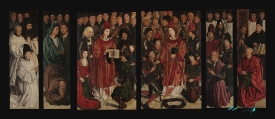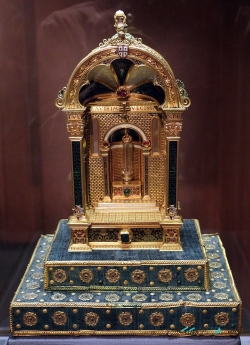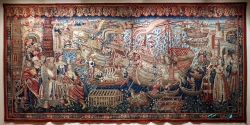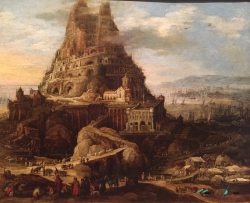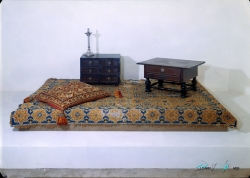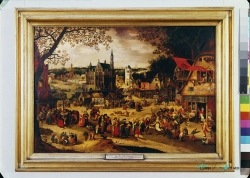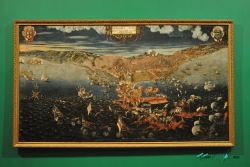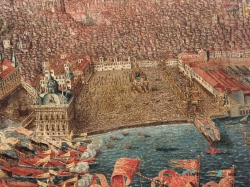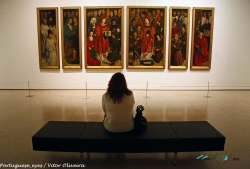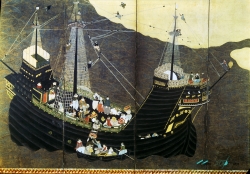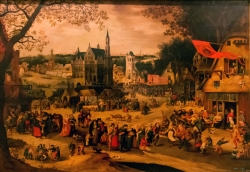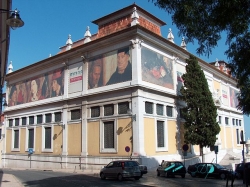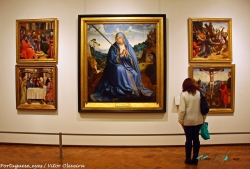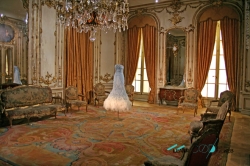The National Museum of Ancient Art is the most important art museum from the 12th to the 19th centuries in Portugal and houses the most important public collection of ancient art in the country. Its collections have about 40,000 pieces, including paintings, sculptures, tapestries, drawings and European decorative arts, as well as collections of Asian art (India, China, Japan, etc.) and African art (Afro-Portuguese ivories) brought to the Portuguese metropolis after the voyages of discovery, which began in the fifteenth century and of which Portugal was a pioneer nation.
The museum is located in a palace from the end of the 17th century, built by Francisco de Távora, the first Count of Alvor, which is why the building is known as the Palácio de Alvor-Pombal. In 1879 the palace was rented, and later acquired, by the Portuguese State to install the National Museum of Fine Arts and Archeology, officially opened on May 11, 1884.
The origins of the museum date back to 1834 when, after the expropriation of religious corporations, the collection of paintings and gold objects belonging to these extinct institutions was expropriated (the inventory of the collection of works of art of the extinct convents is preserved) . The assets were handed over to the care of the National Academy of Fine Arts of Lisbon, installed in the Convent of São Francisco, and its counterpart located in the city of Porto, both founded in 1836. The institutions were responsible for the creation and management of the Museums and Fine Arts Galleries that should serve for the study and learning of fine arts students, also providing for their opening to the general public.
The Museum contains the largest collection of Portuguese painting and other European schools, with great emphasis on works dealing with religious themes, which is due to the fact that the religious class was the main consumer of art in Portugal until the 19th century. from whose monasteries and nunneries provided the initial funds for the museum, at the time of the expropriation (suppression of the religious orders) in 1834. The rich collection of jewelery comes from the convents, given to the religious orders by members of the nobility and the rich bourgeois.
The presence of religious objects increased further with the law of separation of the State and the Church, in 1911, with a new wave of expropriations of works of art that were still in the possession of the Church, either in the Episcopal Palaces or in the temples themselves. It also has many pieces of sculpture, jewelry, including among others the Custódia de Belém and the Custódia da Bemposta, ceramics and other applied arts, which allows a global vision of what the manifestations of Portuguese art and other European schools were, from the Middle Ages to the first half of the 19th century. The collection is also completed with a core of European-influenced Eastern and African pieces, mostly responding to Western orders and destined for these foreign markets. In these pieces the theme of discoveries is always present, illustrating the connections and relationships established between Portugal and Brazil, Africa, India, China and Japan.
The collection comprises around 2,200 paintings of national and European origin; 3,200 pieces of Portuguese, French and European crafts and jewelry from the 12th to the 19th centuries. As for the furniture, made up of 1,700 pieces, it is possible to find Portuguese, European and Oriental pieces. The ceramic collection includes 7,500 pottery and porcelain pieces of Portuguese, European and Oriental manufacture. There are also numerous textiles, with 4,500 pieces that, due to their material characteristics, are exhibited in rotation.
In 2013, the National Museum of Ancient Art was the second most visited state museum (behind the National Carriage Museum), receiving 124,697 visitors.
OPENING TIME
Tuesday to Sunday: 10h-18h
Closed: Monday, January 1, Easter Sunday, May 1, June 13 and December 25
General Admission Tickets:
Normal: €6.00
The museum is located in a palace from the end of the 17th century, built by Francisco de Távora, the first Count of Alvor, which is why the building is known as the Palácio de Alvor-Pombal. In 1879 the palace was rented, and later acquired, by the Portuguese State to install the National Museum of Fine Arts and Archeology, officially opened on May 11, 1884.
The origins of the museum date back to 1834 when, after the expropriation of religious corporations, the collection of paintings and gold objects belonging to these extinct institutions was expropriated (the inventory of the collection of works of art of the extinct convents is preserved) . The assets were handed over to the care of the National Academy of Fine Arts of Lisbon, installed in the Convent of São Francisco, and its counterpart located in the city of Porto, both founded in 1836. The institutions were responsible for the creation and management of the Museums and Fine Arts Galleries that should serve for the study and learning of fine arts students, also providing for their opening to the general public.
The Museum contains the largest collection of Portuguese painting and other European schools, with great emphasis on works dealing with religious themes, which is due to the fact that the religious class was the main consumer of art in Portugal until the 19th century. from whose monasteries and nunneries provided the initial funds for the museum, at the time of the expropriation (suppression of the religious orders) in 1834. The rich collection of jewelery comes from the convents, given to the religious orders by members of the nobility and the rich bourgeois.
The presence of religious objects increased further with the law of separation of the State and the Church, in 1911, with a new wave of expropriations of works of art that were still in the possession of the Church, either in the Episcopal Palaces or in the temples themselves. It also has many pieces of sculpture, jewelry, including among others the Custódia de Belém and the Custódia da Bemposta, ceramics and other applied arts, which allows a global vision of what the manifestations of Portuguese art and other European schools were, from the Middle Ages to the first half of the 19th century. The collection is also completed with a core of European-influenced Eastern and African pieces, mostly responding to Western orders and destined for these foreign markets. In these pieces the theme of discoveries is always present, illustrating the connections and relationships established between Portugal and Brazil, Africa, India, China and Japan.
The collection comprises around 2,200 paintings of national and European origin; 3,200 pieces of Portuguese, French and European crafts and jewelry from the 12th to the 19th centuries. As for the furniture, made up of 1,700 pieces, it is possible to find Portuguese, European and Oriental pieces. The ceramic collection includes 7,500 pottery and porcelain pieces of Portuguese, European and Oriental manufacture. There are also numerous textiles, with 4,500 pieces that, due to their material characteristics, are exhibited in rotation.
In 2013, the National Museum of Ancient Art was the second most visited state museum (behind the National Carriage Museum), receiving 124,697 visitors.
OPENING TIME
Tuesday to Sunday: 10h-18h
Closed: Monday, January 1, Easter Sunday, May 1, June 13 and December 25
General Admission Tickets:
Normal: €6.00



